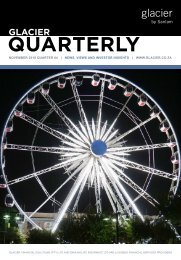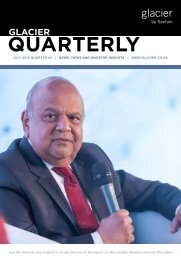Glacier Quarterly 1 - 2018
In this first edition of Glacier Quarterly for 2018, we cast our gaze across the year ahead – with a little more positivity than in previous years.
In this first edition of Glacier Quarterly for 2018, we cast our gaze across the year ahead – with a little more positivity than in previous years.
You also want an ePaper? Increase the reach of your titles
YUMPU automatically turns print PDFs into web optimized ePapers that Google loves.
OFFSHORE INVESTING<br />
Shipping it all out?<br />
The question remains: if an investor<br />
isn’t currently in the fortunate position to<br />
have significant offshore exposure, is now<br />
the time to invest a material proportion<br />
of an investment portfolio abroad? Also,<br />
given the current uncertain political and<br />
economic landscape, should South Africans<br />
consider investing their entire portfolio<br />
abroad?<br />
One should never, of course, ask<br />
questions about timing when emotions<br />
are running high. From an investment<br />
perspective, this is easy to explain. When<br />
the environment is obviously toxic and<br />
herd instinct takes over, the news is<br />
normally already reflected in the price of<br />
assets.<br />
If an investor is incorrectly positioned<br />
at the time, it implies that to correct the<br />
position, they’ll need to sell the unpopular<br />
asset, which in all likelihood will be cheap,<br />
and buy the popular asset, which will<br />
likely be expensive – hardly a trade that<br />
will serve the investor’s interests over the<br />
longer term.<br />
This scenario was evident in 2001, when<br />
South Africans panicked after the rand<br />
rapidly lost ground against cross currencies<br />
at a time when the popular view was that<br />
South Africa was simply another Zimbabwe<br />
in the making. Not only did South African<br />
investors who followed that popular<br />
argument sell a cheap currency (the rand),<br />
they also bought expensive currencies<br />
(US dollars or British pounds). It took the<br />
currency 14 years to get back to those<br />
levels, as can be seen on this graph:<br />
SA Rand versus US Dollar<br />
16<br />
14<br />
12<br />
10<br />
9<br />
8<br />
7<br />
6<br />
5<br />
1999<br />
2000<br />
2001<br />
2002<br />
2003<br />
Even worse, cheap South African shares<br />
were sold to buy expensive offshore<br />
shares. And if this was the only investment<br />
decision made over this period, these<br />
investors will to this day not have caught<br />
up with what their position would have<br />
been had they remained invested in South<br />
Africa, as the next graph shows:<br />
SA Rand versus US Dollar<br />
500<br />
400<br />
300<br />
200<br />
150<br />
100<br />
80<br />
60<br />
50<br />
2001<br />
2002<br />
2003<br />
2004<br />
Is it different this time?<br />
2004<br />
2005<br />
2005<br />
2006<br />
2006<br />
2007<br />
2007<br />
2008<br />
SA ZAR / US$ (11.9141)<br />
So is it different this time, or are<br />
investors who follow the herd instinct<br />
likely to make the same mistake they<br />
did in 2001? Focusing only on the two<br />
most crucial prices, we don’t believe the<br />
situation is entirely the same. First, the<br />
2008<br />
2009<br />
2009<br />
2010<br />
2010<br />
2011<br />
2011<br />
2012<br />
2012<br />
2013<br />
2013<br />
2014<br />
2015<br />
2016<br />
2017<br />
<strong>2018</strong><br />
World Equities Dollars (168.49)<br />
SA Equities US$ (383.136)<br />
2014<br />
2015<br />
2016<br />
2017<br />
<strong>2018</strong><br />
Source: I-NET<br />
Source: I-NET<br />
rand is now not as cheap against the cross<br />
currencies compared to 2001. In fact, the<br />
rand is more or less fairly priced against<br />
the euro and the British pound at current<br />
levels. Second, while we believe the South<br />
African equity market is cheaper than its<br />
international peers – and we’re therefore<br />
reluctant sellers – the price ‘gap’ isn’t as<br />
wide as it was in 2001.<br />
If a portfolio is very biased towards<br />
South African assets, we’ll therefore still<br />
consider migrating money offshore given<br />
the current exchange rate and prices of our<br />
equities. However, we’ll certainly not argue<br />
for a complete disinvestment from South<br />
Africa. Ignoring the jurisdiction where the<br />
liabilities vest (that is, future spending and<br />
income requirements), South Africa still<br />
offers unique investment opportunities at<br />
prices that offer a justifiable future reward<br />
for those prepared to invest in these<br />
opportunities.<br />
In a nutshell<br />
At Sanlam Private Wealth, we manage<br />
our clients’ portfolios actively. Our<br />
investment philosophy rests on the<br />
belief that the level of prices, rather than<br />
investment sentiment, should dictate<br />
investment decisions. While we certainly<br />
don’t ignore the perspective of the<br />
investment environment, we’re wary of<br />
taking radical investment decisions when<br />
emotions have already driven prices<br />
away from their fair values. Against this<br />
background, we’re of the opinion that<br />
it would be inappropriate for a South<br />
African investor to invest an entire portfolio<br />
abroad. However, if an investor’s portfolio<br />
does not have material offshore exposure<br />
currently, we’d consider it prudent at the<br />
current exchange rate of approximately<br />
R12 to the dollar to migrate a portion of<br />
assets offshore.<br />
There are different ways of accessing<br />
the global market – at Sanlam Private<br />
Wealth we provide the full range of options,<br />
with a customised offshore solution to<br />
complement your individual investment.<br />
Alwyn van der Merwe<br />
Director of Investments at<br />
Sanlam Private Wealth






